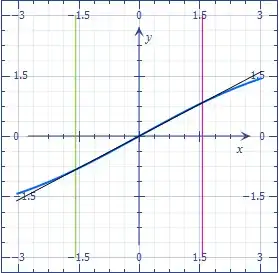A rather good approximation is
$$x=w-\frac{6 (-1766 \sin (2 w)+\sin (4 w)-3676 \cos (w)+156 \cos (3 w))}{45380 \sin
(w)-380 \sin (3 w)-8916 \cos (2 w)+\cos (4 w)+37483}$$ which is the result of one single iteration of a method of order $8$.
Trying for $w=\pi^k$
$$\left(
\begin{array}{ccc}
k & \text{estimate} & \text{solution} \\
1 & 2.402303939 & 2.402507520 \\
2 & 8.967638069 & 8.970865828 \\
3 & 31.89675206 & 31.89410931 \\
4 & 96.66186737 & 96.66210022 \\
5 & 305.0248861 & 305.0781580 \\
6 & 962.1032272 & 962.1030947 \\
7 & 3019.254913 & 3019.325573 \\
8 & 9488.852896 & 9488.852896 \\
9 & 29809.05062 & 29809.05062 \\
10 & 93647.19019 & 93647.19169
\end{array}
\right)$$
Edit
In a comment, the questioner wonders if this is a Padé approximant. The funny answer is that it is and it is not at the same time.
As done, it was the first iterate of an high order iterative method.
But, if we consider the $[1,n]$ Padé approximant (built around $x=w$) of the function
$$f(x)=x-\cos(x)-w$$ it would write
$$P_n(x)=\frac{-\cos(w)+ a^{(n)} (x-w) } {1+\sum _{i=1}^n b_i^{(n)} (x-w)^i }$$ and the approximate solution is
$$x_{(n)}=w +\frac{\cos(w)}{ a^{(n)} }$$ but $a^{(n)}$ depends on the function and derivative values at $x=w$, we find again Newton $(n=0)$, original Halley $(n=1)$, original Householder $(n=2)$ formulae. For example
$$P_0=(x-w) (\sin (w)+1)-\cos (w)$$
$$P_1=\frac{\frac{(x-w) \left(2 \sin ^2(w)+4 \sin (w)+\cos ^2(w)+2\right)}{2 (\sin
(w)+1)}-\cos (w)}{1-\frac{(x-w) \cos (w)}{2 (\sin (w)+1)}}$$
The given result would correspond to $[1,6]$ which is order $8$.
What is amuzing is that for some $n$ appears also a cotangent terms. For example $[1,3]$ gives
$$x=w+\frac{2}{9} \left(1-\frac{2}{\cot \left(\frac{w}{2}\right)+1}+\frac{17 \sin (2
w)+302 \cos (w)}{60 \sin (w)-\cos (2 w)+131}\right)$$
